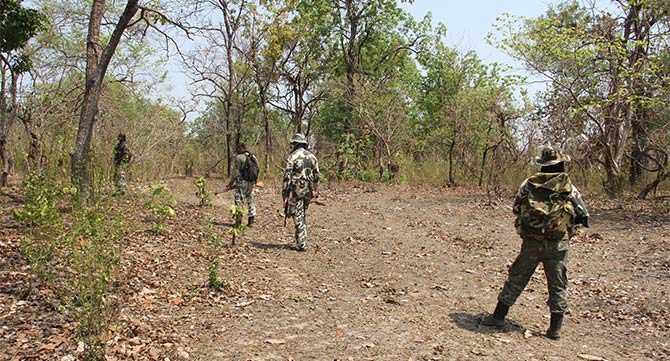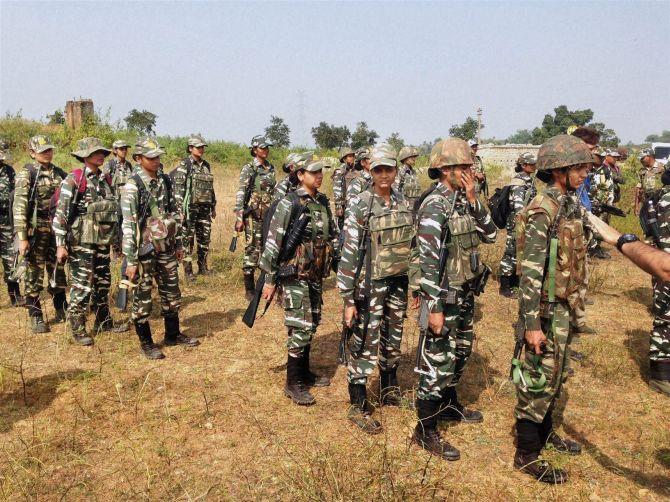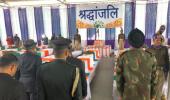'Stress, depression, PTSD and anxiety, especially relating to their domestic lives, are big issues for the men.'
'The men work in extremely difficult conditions, often with the fear of death looming large.'
Sweta Daga reports.

"I am going to do the washing."
"I am going to cook."
"I am going to make chai."
"I am going to dress my children for school."
"I am going to sweep and mop in my house."
These simple commitments come from an unlikely source: The combat-ready men of the Central Reserve Police Force, India's largest central armed police force.
At the CRPF Group Centre in Muzaffarpur, Bihar, officers Piyush Bhardwaj and Vijay Kumar, along with Inspector Rajiv Kumar, lead the session.
Before they begin, Bhardwaj asks the constables to speak openly and leave rank outside the room.
His request is received with a resounding, "Yes, Sir!" and he laughs.
Breaking rank in the CRPF is tough, and hierarchy is sacrosanct.
The session is part of a pilot programme to sensitise the men about gender-related matters and, in the process, encourage mental wellbeing.
"We have a concept of physical wellness in the forces, but not mental wellness," explains CRPF Inspector General (Bihar Sector) Charu Sinha, the brain behind the project.
"Stress, depression, PTSD (post-traumatic stress disorder) and anxiety, especially relating to their domestic lives, are big issues for the men. The problems of home stay with them, and when they feel they have no way of solving or resolving them, they sometimes take drastic measures," she says.
According to the CRPF, it has lost almost 200 men to suicide since 2014.
The men work in extremely difficult conditions, often with the fear of death looming large.
In addition to this, the long periods of separation from their family affect their communication with their spouse, parents and children.
"This adds to the stress, tension and anxiety, and sometimes they do not know how to handle it," Sinha adds.
So she decided to introduce group counselling sessions and even Reiki healing methods.
Seven wellness centres, along with health centres, are also planned at various locations in Bihar where CRPF battalions are based.
Each centre will have counsellors trained by the All India Institute of Medical Sciences, Patna.
Sinha felt it was important to include gender-sensitivity training as well "because our hope is that if the men are able to communicate better with their wives, it might help ease their tension".

So, about 40 officers and constables were chosen to be trained by People for Parity, a non-profit that works on gender, especially gender-based violence, in India.
Over the course of three sessions held at the CRPF headquarters in Patna, the men were taken through frameworks that challenged their notion of gender norms.
For example, they discussed and debated topics such as the disadvantages of being a man. They were introduced to deep listening practices and encouraged to not judge each other or give advice, but to just listen.
For many of the men, these conversations were the first time they had been introduced to these topics.
Once trained, these men will conduct similar trainings for their peers back at their camps.
By the end of March 2020, it is hoped that every camp in Bihar would have held at least two trainings.
The sessions begin with an exercise around the difference between natural and social gender identities. The men are given small chits with words like 'long hair', 'giving birth' or 'wearing jeans'.
They read these out to the group and then the trainers pose questions like: 'What is natural versus social gender behaviour?' 'What is the difference between sex and gender?'
The group then has an open discussion about whether these traits are natural or prescribed by society.
Monica Salve, the only woman officer in the group, contradicts a male constable when he says that men having loud and deep voices is natural and not social.
"I can throw my voice and make it louder or deeper," she says. "I must make it loud when I am commanding my battalion. When some unknown person calls me on the phone, sometimes they mistake me for a man."
She then poses a question: "Is it possible that a woman's voice seems softer because she is told from childhood that she needs to be quieter? That she cannot laugh as loudly or speak confidently?"
There's pushback from the men.
One constable asks, "If there is gender equality, then why am I told not to hit women?"
And so the discussion continues.
Interviewed in smaller groups after the session, the men agree that it added value to their perspective.
"We don't usually get this type of information, so it was a little strange. But we are a part of society. If we change, maybe it will have an effect on our families," one of them says.
In Gaya, officers Yuvraj Kumar and Moti Lal speak openly about how they were resistant to the idea of gender training at first, but admit that mental health is a problem in the force.
"I thought, 'What is this training? Why are we doing it?' But over the last few months it has started to make sense," says Lal.
"When we first started, the commitment I took was to braid my daughters's hair. At first they also thought it was funny, but now they like it and we are able to spend more time together. I also think that group circles are important and that the men need a place to talk about their personal issues."
Kumar adds, "The men sometimes feel they have no one to talk to. Now, with mobile phones, it is worse. Most men are on the phone instead of talking to each other. Charu Ma'am started something interesting this year with us as well. Through the group circle sharing every Sunday, she would have the officers meet together and discuss things beyond work. So they learn to open up and talk about their families and personal lives, providing a place to express."
Sometimes the discussions get heated, with the men arguing that if they didn't have certain rules in place, things would go out of control in their homes.
"If we are not the ones who provide for the household, then our wives and children won't need us. Who will come and talk to us?" says Siyaram Mishra, an inspector.
But asked about the disadvantages and burdens of being a man, they struggle for an answer.

"Peer-to-peer learning is vital for any chance of change to take place," says Aditya Gupta, founder, People for Parity, about the decision to make the men train other men in the camps.
"Many times, in gender trainings and dialogues, women speak to women, and women speak to men, but it is very rare that men speak to men. Without the men speaking and listening, we will not be able to move the conversation forward."
At the Madanpur camp in Aurangabad, the men have already gone through the training and are now creating small plays to illustrate sexual harassment. They have conversations about changing themselves first, and share personal stories of heartbreak and loss.
This is the only camp where the constables bring up the suicide rate in the CRPF.
"There are many reasons why suicides happen, but a lot of it has to do with the family," says Rajkumar Agrahari, a constable.
"We do have a 'buddy' system in the CRPF, but sometimes the policies that exist on paper aren't followed. The training help us see that we have a bigger role in society."
Men, says Sinha, have to be able to understand the role they play in perpetuating gender stereotypes. "So, this small step is important for themselves, their families and society."
Sinha hopes the programme will be expanded to other parts of the country. But she is also aware that she might be transferred and this might not continue.
"I have made my peace with that," she says. "This is just a start -- we are just planting seeds now, and even if it just connects the jawans to their families in a more meaningful way, then I think we will have done something worthwhile."










